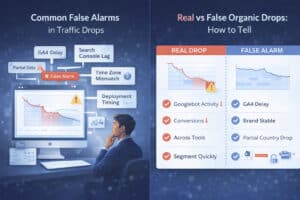If you run a small business, getting found by local customers online is everything. Whether you’re a bakery, law firm, salon, or digital marketing agency, local visibility equals foot traffic, leads, and sales. That’s where local SEO comes in.
In 2025, local search is more important than ever. According to Google, 46% of all searches have local intent, and over 75% of people who search for something nearby visit a business within 24 hours. That means if you’re not showing up in your local search results, you’re missing out—big time.
This guide will walk you through exactly how to optimize your small business for local SEO and get found by customers in your area.

What is Local SEO?
Local SEO is the process of optimizing your website and online presence to rank better in local search results, such as:
-
“coffee shop near me”
-
“best hair salon in [city]”
-
“SEO services in [neighborhood]”
Google uses location signals like your Google Business Profile, reviews, proximity, and local content to determine which businesses to show. That’s why local SEO is different from general SEO—it’s more about being the best answer for nearby searchers.
Step 1: Claim and Optimize Your Google Business Profile (GBP)
If you only do one thing for local SEO—do this.
Your Google Business Profile (formerly Google My Business) is the foundation of your local presence.
How to optimize it:
-
Claim and verify your profile: google.com/business
-
Use your exact business name, matching your website.
-
Choose the most accurate primary category (e.g., “Digital Marketing Agency”).
-
Add high-resolution photos and your logo.
-
Fill in your business hours, phone number, and address.
-
Add your website URL.
-
Enable messages and respond promptly.
-
Post regularly to share updates, offers, or events.
The more complete and accurate your profile is, the more likely you’ll appear in the Google Map Pack (the top 3 map listings shown for local searches).
Step 2: Optimize for Local Keywords
Local SEO starts with understanding what people in your area are searching for.
Use tools like:
-
Google’s “People also ask”
-
Ubersuggest or Keywords Everywhere
-
Google Search Console (for existing search data)
Example local keywords:
-
“affordable plumber in Scarborough”
-
“custom cakes downtown Vancouver”
-
“SEO agency near Queen West Toronto”
Use these keywords in:
-
Page titles and H1 tags
-
Meta descriptions
-
URL slugs
-
Body content
-
Image alt text
Keep your content natural and readable. Avoid keyword stuffing.
Step 3: Create Location-Specific Landing Pages
If your business serves multiple cities or neighborhoods, create dedicated landing pages for each one.
For example:
-
yoursite.com/seo-services-toronto
-
yoursite.com/seo-services-mississauga
Each page should be:
-
Unique (no copy-pasting)
-
Focused on that specific location
-
Include local testimonials or project examples
-
Optimized with local keywords
These pages help you rank for location-specific searches and improve relevance for each area you serve.
Step 4: Ensure Consistent NAP Across the Web
NAP = Name, Address, Phone Number
This trio must be consistent everywhere your business appears online.
Check and update:
-
Google Business Profile
-
Website footer/contact page
-
Social media profiles
-
Online directories (Yelp, YellowPages, Bing Places, etc.)
Inconsistent NAP data can confuse search engines—and lower your rankings.
Step 5: Get More 5-Star Reviews
Online reviews are a major local ranking factor—and they influence customer trust.
Encourage happy clients to leave reviews:
-
Send follow-up emails with a direct link to your GBP
-
Ask in person or at checkout
-
Include a call to action on your website
Respond to every review—good or bad. This shows engagement and builds trust with future customers.
Step 6: Build Local Backlinks and Citations
Local SEO isn’t just about on-page content. Backlinks from local sources and mentions of your business (citations) help boost your authority.
Ideas for local backlinks:
-
Sponsor a local event or team
-
Join your city’s chamber of commerce
-
Submit guest posts to local blogs or news outlets
-
Collaborate with nearby businesses
Also, list your business in:
-
Foursquare
-
Industry-specific directories
Step 7: Add Local Business Schema Markup
Schema is a type of structured data that helps search engines understand your content better.
Add LocalBusiness schema to your site to highlight:
-
Business name
-
Address
-
Hours
-
Phone
-
Geo coordinates
This increases your chance of appearing in rich results, which can improve click-through rates.
Step 8: Track and Measure Your Local SEO Performance
What gets measured, gets improved.
Key metrics to watch:
-
Google Business Profile insights: Views, searches, calls, directions
-
Google Analytics: Local traffic sources
-
Search Console: Keyword performance
-
Rank tracking tools: See how your location pages perform
Adjust based on what works—double down on content that brings in traffic and tweak pages that underperform.
Bonus: Use Social Media for Local Awareness
Social signals aren’t a direct ranking factor—but an active presence helps you connect with the local community and drive branded searches.
Local social media tips:
-
Tag your location on posts
-
Use city- or neighborhood-specific hashtags
-
Share local events, news, and community involvement
Final Thoughts
Local SEO is one of the most powerful tools a small business can use to compete online. It’s not about outspending the big guys—it’s about being visible where it counts most: your local neighborhood.
By optimizing your Google Business Profile, using local keywords, gathering reviews, and building your local presence, you can attract more foot traffic, more leads, and ultimately more sales.
Need help putting it all together? Our digital marketing agency specializes in local SEO strategies that get small businesses found—fast. Reach out today and let’s grow your local footprint.
About The Author
Jana Legaspi
Jana Legaspi is a seasoned content creator, blogger, and PR specialist with over 5 years of experience in the multimedia field. With a sharp eye for detail and a passion for storytelling, Jana has successfully crafted engaging content across various platforms, from social media to websites and beyond. Her diverse skill set allows her to seamlessly navigate the ever-changing digital landscape, consistently delivering quality content that resonates with audiences.




